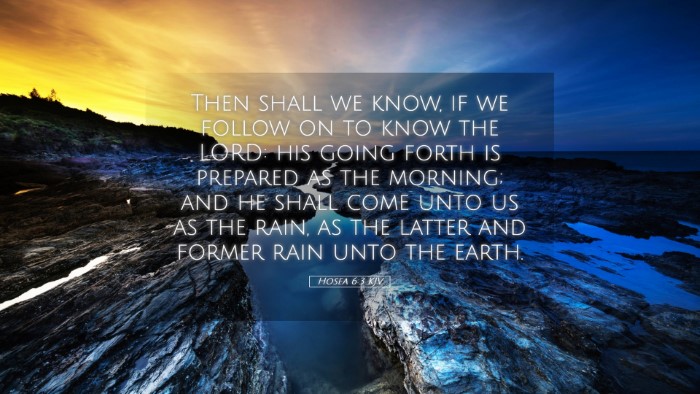Old Testament
Genesis Exodus Leviticus Numbers Deuteronomy Joshua Judges Ruth 1 Samuel 2 Samuel 1 Kings 2 Kings 1 Chronicles 2 Chronicles Ezra Nehemiah Esther Job Psalms Proverbs Ecclesiastes Song of Solomon Isaiah Jeremiah Lamentations Ezekiel Daniel Hosea Joel Amos Obadiah Jonah Micah Nahum Habakkuk Zephaniah Haggai Zechariah MalachiHosea 6:3
Hosea 6:3 KJV
Then shall we know, if we follow on to know the LORD: his going forth is prepared as the morning; and he shall come unto us as the rain, as the latter and former rain unto the earth.
Hosea 6:3 Bible Commentary
Commentary on Hosea 6:3
Verse Text: "Then shall we know, if we follow on to know the LORD: his going forth is prepared as the morning; and he shall come unto us as the rain, as the latter and former rain unto the earth." (Hosea 6:3, KJV)
Introduction
The book of Hosea is a profound testament to God's unwavering love amidst Israel's unfaithfulness. In Hosea 6:3, the prophet offers a dual promise of knowledge and divine visitation. This commentary draws upon insights from various public domain sources, including Matthew Henry, Albert Barnes, and Adam Clarke, to elucidate the theological and practical implications of this verse.
Contextual Background
Before delving into the specifics of Hosea 6:3, it is critical to understand the socio-political context of Israel during the prophecy. Israel, as a nation, was steeped in idolatry and moral decay. Hosea's message often alternated between judgment and hope, reflecting the tension between God’s righteousness and His mercy. This verse appears within a broader discourse about repentance and the conditions necessary to experience God's restoration.
Literary Structure
Hosea 6:3 is structured around the themes of knowledge of God and divine presence. The first part of the verse highlights a call to actively pursue knowledge of the Lord, while the second part assures of God's faithful return, akin to the dependable cycles of nature.
1. Following on to Know the LORD
Matthew Henry emphasizes that knowing the Lord requires an active pursuit that involves a commitment to faithfulness. The phrase “follow on” suggests a continuous, deliberate effort, akin to a discipline that leads one deeper into relationship and understanding.
- Active Engagement: Adam Clarke notes that genuine knowledge of God is not merely intellectual but stems from personal experience with the divine.
- Spiritual Growth: Barnes reiterates the importance of perseverance in seeking God, portraying it as essential for spiritual maturation and understanding.
2. The Assurance of Divine Encounter
The latter part of the verse uses natural imagery to depict God's presence; the comparison to rain conveys nurturing and life-giving qualities. Clarke elucidates that just as rain brings refreshment to the earth, God's presence revives and restores His people.
- Faithfulness of God: All three commentators stress that God's coming is as certain as the morning light and the rains of the season, symbolizing reliability.
- Hope for Restoration: This imagery also serves as a profound hope for Israel, assuring them that despite their unfaithfulness, divine mercy awaits them when they seek Him genuinely.
Theological Implications
Hosea 6:3 contains rich theological themes that resonate across Scripture. The commitment to “know the LORD” reflects a covenant relationship where knowledge and faith act as pivotal foundations. Furthermore, the assurance of God’s coming embodies the character of God as faithful, merciful, and deeply involved in the lives of His creation.
1. Covenant Relationship
Henry articulates that knowing God signifies more than mere acknowledgment; it implies a relational depth that leads to transformation. This relationship is characterized by mutual faithfulness—a theme that permeates the narrative of Israel and God's covenant.
2. Revelation and Experience
Barnes observes that the pursuit of knowledge of God is deeply tied to the revelation of His nature and character. It is through experience and obedience that one comes to truly know God:
- Reflective Knowledge: Knowledge of God is not static but dynamic, continually deepening through engagement with His word and works.
- Grace and Repentance: The implication of grace in this verse reassures that even in falling short, repentance opens the way to encounter Him once again.
Practical Application
For pastors, students, theologians, and Bible scholars, Hosea 6:3 serves as a call to cultivate a deeper relationship with God marked by diligence and repentance. It challenges the community of faith to:
- Pursue God Persistently: Engage in continual pursuit through prayer, scripture reading, and community fellowship.
- Embrace God’s Faithfulness: Trust in God’s promises and seek to experience His presence as a source of renewal and purpose in life.
Conclusion
Hosea 6:3 encapsulates the journey toward understanding God—a journey that requires both pursuit and anticipation of His presence. The combined insights of Matthew Henry, Albert Barnes, and Adam Clarke collectively reinforce the call to know God, assure of His faithfulness, and embrace the relational dynamics inherent in our covenant with Him. As the people of God, may we strive to follow on in knowing Him, preparing our hearts for the refreshing rains of His grace.


